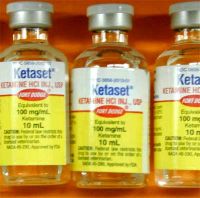Ketamine as rabies treatment
 |
In the current issue of Scientific American, there's an article about the first case ever recorded of someone surviving rabies without getting vaccinated immediately after getting infected. The remarkable breakthrough treatment: ketamine! From the article:
The rabies virus was apparently capable of hijacking the brain into killing the body, but without directly damaging the brain tissue itself. If we could inactivate the malfunctioning brain through careful use of drugs, putting Jeanna into a state of prolonged unconsciousness, it would restrain the terrible havoc wrought on her body and perhaps keep her alive long enough to allow her immune system to catch up.
To choose which drugs made the most sense, I searched the medical literature for studies connecting rabies with neurotransmitters or neuroprotection. This search uncovered an astonishing pair of papers by Henri Tsiang of the Pasteur Institute in Paris. In the early 1990s Tsiang and his colleagues reported that ketamine, an anesthetic, was capable of inhibiting the rabies virus in the cortical neurons of rats. The work was reassuring for three reasons. First, the research indicated that ketamine affected a key step in the life cycle of the virus, when it is transcribing its genetic information inside the neuron. Second, the drug hindered only the rabies virus and not other viruses, suggesting that its effect was not a result of general toxicity to the animal. Third, a similar but more toxic drug called MK-801 also inhibited rabies in rat neurons, so the benefit most likely applied to an entire class of compounds.
For more than 25 years, surgeons have used ketamine to induce and maintain unconsciousness in their patients, although it has largely been replaced because of its hallucinogenic side effects. (Illicit recreational users of the drug call it Special K.) Interestingly, ketamine's side effects appeared to offer another potential advantage for rabies patients. Ketamine acts as a neuroprotectant by blocking membrane proteins called NMDA glutamate receptors, which can kill neurons after becoming overactive following a stroke or other type of brain injury. Imagine my excitement to read about a drug that could contribute to suppressing the malfunctioning brain, while simultaneously clearing rabies virus and protecting the brain against further insult!
The article describes the treatment in some detail, including other drugs coadministered. In the end, Jeanna survived with almost no ill effects, becoming the only person ever to survive the disease without immunization.
|

Recently @ DoseNation
|
|






















The comments posted here do not reflect the views of the owners of this site.